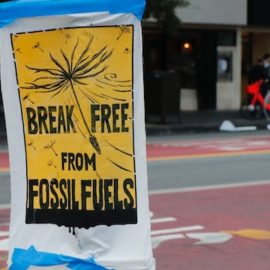

This article is an excerpt from the Shortform book guide to "How to Avoid a Climate Disaster" by Bill Gates. Shortform has the world's best summaries and analyses of books you should be reading.
Like this article? Sign up for a free trial here.
What is Bill Gates’s take on climate change? What can we do collectively to curb emissions that are heating our planet?
Bill Gates’s decades of philanthropy inform his views on the urgent need to address climate change while still encouraging development. In his book How to Avoid a Climate Disaster, he highlights the roles governments, private entities, and individuals must play if we hope to eliminate carbon emissions by 2050.
In this article, we’ll discuss Bill Gates’s proposed solutions to tackling climate change at the level of governments, businesses, and individuals.
National Government
According to Gates, the most meaningful reductions in carbon emissions will start at the highest levels of government because they can create and enforce the large-scale policies needed to achieve significant carbon reduction quickly. However, Gates recognizes that enacting change at the highest levels of government is challenging for many reasons, including:
Entrenched Systems: Our current systems are set up for fossil fuels. A switch to carbon-less energy would necessitate modifications at every level of government, from international trade agreements and economic policies to physical infrastructure (including a new national power grid) and building codes, down to outfitting individual homes for renewable energy sources.
Changing Administrations: Turnover is a significant challenge for climate activism in government because different elected officials and administrations have different agendas, priorities, and methods. Therefore, it can be difficult to enact meaningful climate policy and see it through before terms run out or political priorities change.
Lack of Funding: Gates explains that only .02% of the global economy is currently directed toward climate-related research and development. Given the potentially devastating impacts of climate change, Bill Gates suggests that this figure should be much higher.
Note: To Gates, government hesitancy about investing in carbon-less energy is nonsensical. Instead, he explains that governments should be rushing to invest in climate-related technology because any green technology that can outcompete fossil fuels in price and efficiency will be guaranteed a massive international market.
The Cost of Shifting to Greener Energy Sources: Markets favor fossil fuels because they’re cheap relative to other energy sources. Additionally, governments have historically subsidized fossil fuels to keep prices down instead of pushing the market towards carbon-less alternatives. Gates explains that governments should take an active role in making green energy affordable because once carbon-less energy can match or beat fossil fuel prices, addressing global warming will make financial sense whether individuals, businesses, or countries are committed to reducing emissions or not. For example, governments could:
- Increase the cost of carbon-emitting products to reflect the damage they cause
- Subsidize or create other incentives to help consumers choose greener products
- Enforce new emissions standards for products and companies so that producers have to make lowering emissions while keeping prices affordable a priority to stay in business
Local Government and Private Business
Local and regional governments and businesses can help curb carbon emissions by factoring them into local standards, regulations, and budgets. For example, public utility companies should invest in renewable energy and subsidize efforts to make carbon-less energy affordable and feasible for their customers. Additionally, Gates notes that as consumers, governments and businesses have more power to shape the market than individuals because of their size. Therefore, they should support green products or companies whenever possible. For example, a local municipality could invest in a fleet of hybrid school buses.
Gates recognizes that a large-scale shift away from fossil fuels will benefit the planet but may devastate some families and communities when fossil fuel industries downsize and jobs are lost. Therefore, local governments must be proactive in assessing what a shift toward carbon-less energy will mean for their constituents and make a plan to support them.
Individuals
Lifestyle changes such as reducing energy consumption at home, purchasing an electric car, and consuming fewer animal products are valuable because they reduce our carbon footprint and, more importantly, send a message to the market about what consumers want. However, Gates explains that our individual efforts to reduce our emissions have little impact on global warming. Instead, the most important thing individuals can do to reduce carbon emissions is engage in the political process. Gates stresses the importance of voting for elected officials and policies that prioritize the climate, becoming active in local politics, and running for office.

———End of Preview———
Like what you just read? Read the rest of the world's best book summary and analysis of Bill Gates's "How to Avoid a Climate Disaster" at Shortform.
Here's what you'll find in our full How to Avoid a Climate Disaster summary:
- Bill Gates's technology-based strategies for reducing global carbon emissions
- The challenges and limitations that come with fighting climate change
- The roles governments, private entities, and individuals must play to save the planet






